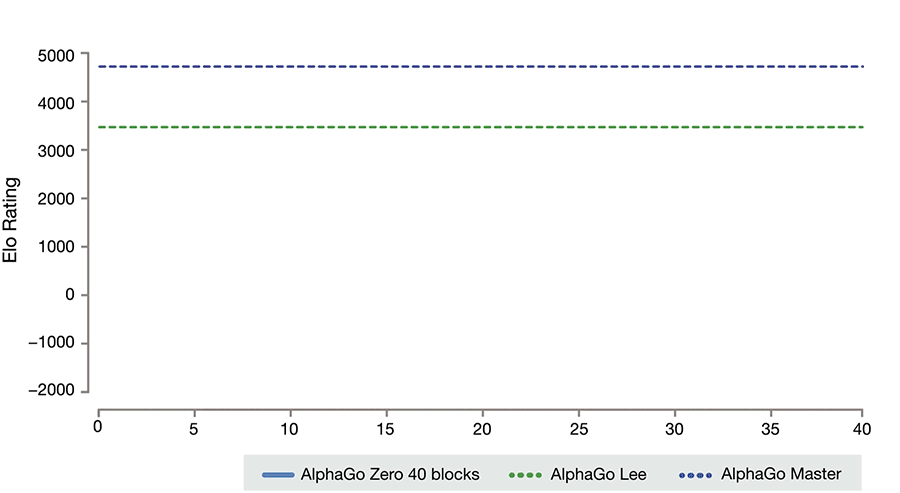Just as the early adopters of the internet had a competitive advantage, so do the early adopters of Artificial Intelligence (AI) today.
AI is playing a growing role in our day-to-day lives, especially in marketing, and while we are just at the beginning, is already showing its incredible capabilities.
For example: Do you remember when AlphaGo, an AI program developed by Google’s DeepMind that plays the complex board game Go, defeated the world’s best human Go player?
Then, when the next version of Alpha Go, AlphaGo Zero, beat AlphaGo 100 to 0?

These demonstrations marked a major public turning point in what AI can do. With its enormous processing power, AI has the potential to perform certain tasks humans are currently spending time on… only better.
AdWords Smart Bidding
In 2016, Google provided the exciting announcement that more powerful bid automation would be coming to AdWords in the form of Smart Bidding. Smart Bidding is a statistical approach that helps marketers identify signals from conversions and optimises bids automatically to achieve their targets.
With Smart Bidding, Google is trying to help advertisers automatically bid the correct amount based on their measured goals.
But, the application of Smart Bidding in your AdWords account is not as simple as we expected.
In order to effectively use it, we need to understand the way machine learning translates data into meaningful bidding strategies.
Machine learning uses historical data to build a model to predict future events.

One way to explain Smart Bidding is through linear regression modeling. This model carries out a predictive analysis to explain the relationship between one dependent variable and one or more independent variables. One typical question sample is “how many additional sales would I get for every $100 spent in marketing?”.
In AdWords Smart Bidding, the independent variables are the contextual signals that Google takes into account into your bid optimisations. These include millions of signal points such as user location, time of the day, device, actual search terms, the type of ad creative, etc.
Similar to linear regression modeling, the richer the data you feed into the model, the more powerful and accurate the result would be. In this Smart Bidding whitepaper, Google explains how richer contextual signals help determine how much you should bid more accurately. As an AdWords agency, this was yet another reminder of how critical precise measurement is – so many decisions depend on it.
Q: How often does the algorithm update?
If you are using Doubleclick Search, the bidding model is optimised up to 4 times in a day. With Smart Bidding, the algorithm updates at each and every auction based on the contextual signals from users. This is the most precise and granular level of optimisations called auction-time bidding.
Make sure that your Doubleclick and AdWords bidding strategies do not overlap though and that only one is chosen. If you prefer using an all-in-one solution that allows you to manage and report different search engine accounts under one platform, then Doubleclick will provide this while also optimising your bids based on the bid strategy.
However, Doubleclick will not be able to optimise on auction-based bid strategies such as Enhanced CPC which is available in AdWords. So implementing both Doubleclick and AdWords bidding strategies may not be the best idea as Doubleclick will sync over your already-optimised bids and feed on biased data inputs.
Q: What if there are days in a month that your conversion tracking does not work?
This may disrupt the learning process for conversion based bid strategies that lead the system to think that its optimisations are not resulting in any conversions.
In AdWords Smart Bidding, we are still unable to exclude missing or inaccurate data. If you are using Doubleclick bid management, you should be aware of the data exclusion event that allows an advertiser to exclude clicks and conversions data from a time period from bid adjustments.
In AdWords Smart Bidding, it is recommended to verify the correct conversion actions for the bid strategy and to opt for manual bidding until the conversion tracking is fixed, rather than feeding the machine with false data and lengthen the learning process.
Q: For B2B companies where the conversion path is more complex and challenging, would they benefit from AI?
Following the previous question, this is definitely a good point to consider. Some high-value leads for a software company, for example, may take more than 90 days to convert into sales. This poses the question of whether smart bidding is the right solution for all types of businesses. Due to the requirements and best practices of machine learning (i.e. a high volume of monthly conversion data), smart bidding may not be the best way to optimise your campaigns.
It is still important, however, to be able to understand how your overall online presence (each touch point in the customer journey) may contribute to the final conversion. More information about this can be found at the following links: Measuring the full value of your ads & Track offline conversions.
So Who Is Smart Bidding Really Beneficial For?
This may slightly contradict what Google says in “that all accounts should benefit from this powerful tool”.
In the long-term, Smart Bidding absolutely needs to be considered in your PPC strategy considering the often time intensive and manual nature of optimising bids. However, since Smart Bidding is still in its infancy and it learns solely from the data we input, it needs close monitoring and guidance for it to reach its goal effectively.

The machine is always right… or is it?
Here are some key things to look out for when applying bid strategies to your AdWords campaign:
Does the campaign have enough historical data?
Smart Bidding application can be a lengthy process if applied to a new campaign. Google’s Smart Bidding needs a minimum of 30 conversions for target CPA bidding and 15 conversions for target ROAS bidding in the past 30 days.
In the whitepaper I mentioned above, Google also explains that the Smart Bidding takes into account search queries at ad group and campaign level in its optimisations, as additional data points when keyword-level conversion data is scarce. However, with that being said, if you have single keyword ad groups, the system will not optimise across queries. Hence, it is better to apply bid strategies to campaigns with enough conversion data rather than new campaigns.
Do you change your daily campaign budget frequently?
If you plan to use the ‘Maximise Clicks’ bid strategy, try to keep your campaign daily budgets fairly steady. The algorithms will need time to adjust to significant changes and conversion delays. When the budget is changed, AdWords will let you know that the algorithm is adjusting to optimise your bids when you hover over a speech bubble next to your bid strategy status.
Test it on high volume campaigns.
It is best practice to choose the largest campaign that you are comfortable experimenting with. In predictive analysis, the more data sample you feed into the system, the more accurate and unbiased the model would be. Most marketers with a substantial marketing budget and large conversion data should already be using the algorithm to do their bid optimisations considering its efficiency, large sample and low error rates. You are putting yourself at a disadvantage if you are not.
Does your campaign get affected by industry seasonality?
For accounts that depend largely on seasonality such as Christmas peak season or other macro changes, Smart Bidding will include that in its algorithm. Google even considers weekdays vs weekend differences in its propagations. Make sure that during the peak season, you have enough budget to account for the increase in search volume.
Consider split testing using ‘Drafts’ and ‘Experiments’.
Rather than putting all eggs in one basket, try A/B testing the campaign with Drafts and Experiments. I find this helpful and less risky when I try a new bid strategy and let it run for as long as the learning period needs. Make sure you have twice the number of conversions needed since you will be splitting 50% of the campaign to run under a bid strategy. If you don’t have enough conversion volume, you can alternatively run a pre/post comparison.
So machine learning and artificial intelligence sounds like it could be a magic bullet… but is it really?
Imagine a situation where a PPC manager no longer needs to understand the fundamentals of AdWords and its auction bidding system. If performance suddenly drops, there is a chance that they will have become over-reliant on the tool and complacent in their day to day activity. This could cause them to struggle to turn things around and improve performance.

It is important for the manager to lead the strategy and maintain a combination of a creative flare for ad copy and landing pages and commercial acumen in considering all the factors that could be contributing to the performance. They then need to take all the information into account when planning the required actions they need to take to drive things forward.
In digital marketing, machine learning should be applied as a competitive edge to help increase the yield from the channel, or as an efficiency saving when it comes to time-consuming and repetitive tasks.
Contrary to popular belief, while machine learning and artificial intelligence creates efficiencies in account optimisation, what it does not do is replace your effort and human insight to improving the performance of the account.
I hope this guide has allowed marketers and business owners to better understand the basics of ML, and advance on their businesses’ online presence through the power of machine learning.
If you enjoyed this article and think others would too, we always appreciate a Like, Tweet or Share. Happy optimising and bid responsibly 🙂
